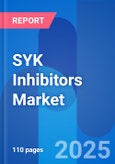Increasing Clinical Validation and Regulatory Incentives Support Long-Term Revenue Expansion
Report Findings & Highlights:
- Global SYK Inhibitor Market Growth 2020-2024: 13% CAGR
- Approved SYK Inhibitor Drugs: 1
- Dosage, Price & Sales Insight of Approved Drug
- Global Market Trend, Size & Future Opportunity Outlook
- Comprehensive Insight on Global SYK Inhibitors Clinical Pipeline: > 15 Drugs
- Global SYK Inhibitors Clinical Pipeline by Company, Indication & Phase
- Competitive Landscape
SYK Inhibitors Need & Why This Report?
The SYK inhibitors market is rapidly developing, with growing recognition of the enzyme target, SYK, in immune response and inflammation regulation. SYK inhibitors have become an encouraging new therapeutic class, especially in the treatment of autoimmune diseases, hematological conditions, and cancer. This report describes in detail the landscape of SYK inhibitors, tracking recent scientific advances, clinical trials, and future commercial opportunities. With targeted immune therapies on the rise, SYK inhibitors are in a position to help with pressing unmet medical needs, making this class increasingly important to investors, researchers, and clinicians.
Clinical Studies & Trials Insight Included in This Report
The report gives comprehensive insight into the currently ongoing clinical studies of SYK inhibitors. At present, multiple clinical trials are going on; the majority of them are on autoimmune diseases such as rheumatoid arthritis, ITP, and SLE, where SYK plays a crucial role in the activation of immune cells and inflammation. Besides, trials on cancer are also gaining momentum as SYK inhibitors are being considered for hematological malignancies and solid tumors.
Some other ongoing trials involve emerging candidates, such as Sovleplenib and other experimental drugs, while others, including the first approved SYK inhibitor, fostamatinib (Tavalisse), are still being evaluated in active trials. Of these, some evaluate the efficacy of combining SYK inhibitors with other therapies, such as JAK inhibitors or chemotherapy, to improve outcomes and reduce resistance in conditions like cancer. These trials represent growing interest in the clinical potential of SYK inhibition from a global perspective, spread across North America, Europe, and Asia. The section thus serves as an invaluable resource for stakeholders by providing key insights into the therapeutic potential and geographic spread of these inhibitors.
Leading Companies Engaged in R&D of SYK Inhibitors
A growing number of pharmaceutical companies and biotech firms are actively involved in the research and development of SYK inhibitors. Rigel Pharmaceuticals, with its marketed product fostamatinib, remains a key player, but other companies are also making strides in this field. Hutchmed's Sovleplenib (HMPL-523), currently progressing through late-stage trials, represents one of the most promising candidates in the pipeline, particularly for ITP. This drug has already received Breakthrough Therapy designation, further underlining its potential to address significant unmet needs in immune thrombocytopenia.
Other companies involved in SYK inhibitor development include major pharma players such as Gilead Sciences and smaller biotech firms such as Ignota Labs and Arcus Biosciences. These companies are targeting a variety of indications, ranging from autoimmune diseases to cancer. Many of these drugs are being tested in combination regimens in an effort to improve response rates and beat back challenges, such as treatment resistance. As the competitive landscape for SYK inhibitors continues to grow, collaboration and licensing agreements are becoming increasingly used as a means of advancing clinical research while accelerating the path to market.
Indicating the Future Direction of the SYK TIGIT Inhibitors Segment
The segment of SYK inhibitors will see more significant growth in the future with more drugs entering the clinical pipeline and new indications being explored. With the first SYK inhibitor, fostamatinib, already approved for ITP, the therapeutic class is gaining acceptance, and its potential is being further recognized in oncology and autoimmune disease management. The ability of SYK inhibitors to target critical immune cell pathways positions them as an attractive option for diseases with limited treatment options such as chronic lymphocytic leukemia and rheumatoid arthritis.
With new clinical data continuing to emerge, combinations of SYK inhibitors with other immunotherapies, such as PD-1/PD-L1 inhibitors, or with conventional chemotherapy may unlock even greater therapeutic potential. Moreover, research into biomarkers predictive of response to SYK inhibition could enable personalized treatments. This trend is expected to give rise to the development of next-generation SYK inhibitors that could become cornerstones for treating autoimmune and hematologic disorders and even oncology. The market for SYK inhibitors is expected to grow rapidly, with regulatory bodies such as the FDA and EMA offering priority reviews to certain candidates. Further into the future, as trials progress along with the approval of new drugs, the impact of SYK inhibitors on patient care and the broader landscape will continue to increase, bringing hope to patients and opportunities to stakeholders in healthcare and the biopharmaceutical industry.
Table of Contents
Companies Mentioned (Partial List)
A selection of companies mentioned in this report includes, but is not limited to:
- Aptose Biosciences
- CrystalGenomics
- CSPC Ouyi Pharmaceutical
- Formation Bio
- Genosco
- Hanmi Pharmaceutical
- HUTCHMED
- IACTA Pharmaceuticals
- Ignota Labs
- Rigel Pharmaceuticals








